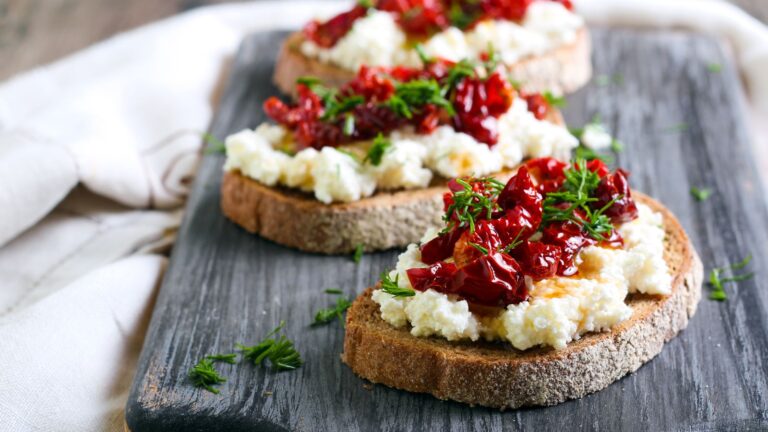It’s no secret that times change, and with them, so do our tastes and preferences. Sometimes, the generational divide can leave older folks feeling a bit out of the loop, especially when it comes to food trends. In this case, we’re diving into 17 foods that millennials adore but leave boomers scratching their heads.
Plant-Based Burgers

The popularity of plant-based burgers is driven by millennials’ demand for sustainable and vegetarian alternatives to meat, as shared by CAS. Most boomers, however, see this as unnecessary and don’t believe that classic meat burgers should be replaced. Get with the times, Grandpa!
Food Trucks and Street Food

Older generations may see street food as cheap and prefer traditional sit-down restaurants for quality dining. Nonetheless, gourmet food trucks are increasing in popularity. This rise reflects millennials’ desire for diverse, convenient dining and highlights a shift in dining culture toward more casual, experiential eating.
Avocado Toast

An absolute staple in millennial cuisine, avocado toast is often consumed for its health benefits, delicious taste, and versatility. It represents a shift toward healthier, more Instagram-worthy meals. However, some boomers believe that such a simple dish shouldn’t be as expensive or as obsessed over as it is.
Craft Beer and Microbrews

Some boomers view craft beers and microbrews as a fad—an overly complicated way of enjoying beer. Millennials, on the other hand, defend these drinks, as they value uniqueness and quality in their beverage of choice. According to the CBR, “By 2018, sales data showed that millennials were buying 34 percent of craft beer, compared with 20 percent for baby boomers (born 1946–64) and 13 percent for the Greatest Generation (born before 1928).”
Açai Bowls

Açai bowls are popular for their vibrant color and perceived health benefits, and are seen as a symbol of the wellness and “food as an experience” culture for many young people. They’re often, however, considered overrated by those outside the millennial demographic, so perhaps this isn’t something to share with your grandparents!
Bubble Tea

According to National Geographic, bubble tea is a Taiwanese drink that’s gained a massive following for its unique texture and variety of flavors, showcasing millennials’ love for quirky, Instagrammable beverages. Boomers, however, may find the tapioca pearls and sweet flavors unfamiliar and unappealing.
Sushi Burritos

Sushi burritos are a fusion of Japanese and Mexican cuisines and appeal to millennials’ love for global flavors and unconventional food combinations. Unfortunately, older people may view these burritos as a gimmick or an unnecessary alteration of traditional sushi in an attempt to appear trendy.
Kale Everything

Kale is unavoidable nowadays, a fact that is bewildering to boomers who see its sudden rise to fame as unwarranted since they feel it’s just another leafy green. Regardless, kale represents the health-conscious and trend-driven eating habits of millennials and can be found everywhere, from salads to smoothies.
Quinoa Bowls

Hailed for its high protein content and gluten-free nature, quinoa is a go-to for health-conscious millennials and can perhaps be seen as a shift toward more diverse and global food choices. Of course, its newness draws criticism from boomers who just see it as a trendy, over-hyped grain substitute.
Iced Coffee

Millennials’ interest in specialty coffee culture is well known, with iced coffee being a new trend embraced for its smooth flavor and artisanal brewing methods. This has drawn criticism from older generations who might prefer classic, hot brewing methods, viewing iced coffee as a trendy, overpriced option.
Matcha-Flavored Everything

From lattes to desserts, matcha has become a favorite for its health benefits and distinct flavor, reflecting millennials’ enthusiasm for global flavors and health-conscious choices. However, some boomers may not understand the appeal of this bitter green tea powder in so many products, leading to confusion about its ubiquity.
Poké Bowls

Poké bowls are another example of millennials’ love for aesthetically pleasing, nutritious meals. The Hawaiian-inspired dish has become a hit for its fresh ingredients and options for customization. This, naturally, has drawn accusations from boomers who claim it to be another fad food.
Artisanal Toast

Reflecting a broader trend of elevating basic dishes to gourmet status among millennials, artisanal toast uses high-quality ingredients and unique toppings to improve the basic breakfast item. Many boomers just laugh at the trend; after all, how can you manage to make bread complicated?
Fermented Foods

Fermented food from all over the world, such as kimchi and kombucha, is growing in popularity, driven by health trends and millennials’ adventurous palates. This change is not appreciated by all, however, with many from the older generation not being able to appreciate the strong flavors and textures of these foods.
Ramen (Upgraded From Instant Noodles)

It has become increasingly popular nowadays to upgrade instant ramen into something more fancy, but boomers may see this as an unnecessary luxury version of instant noodles—a budget-friendly staple. Millennials may be willing to invest in upgraded versions of familiar comfort foods, but boomers aren’t.
Non-Dairy Milk Alternatives

Almond, oat, soy, and coconut milk are popular among millennials as alternatives to dairy, with this popularity mainly being driven by dietary preferences, environmental concerns, and lactose intolerance. The rise of non-dairy alternatives may be confusing to older people who don’t understand the reasons behind replacing milk with a substitute.
Jackfruit

Jackfruit has gained popularity as a plant-based substitute for meat, particularly in vegan and vegetarian dishes, as its texture mimics that of popular meats such as pulled pork or chicken. It is a versatile ingredient in tacos, sandwiches, and curries. Reflecting millennials’ shift toward plant-based diets, meat substitutes are baffling to boomers who just can’t get over the difference in taste between jackfruit and real meat.

